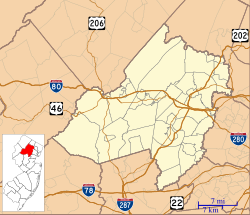Lindenwold | |
 | |
| Location | 247 South Street Morristown, New Jersey |
|---|---|
| Coordinates | 40°47′40″N74°29′04″W / 40.79444°N 74.48444°W |
| Built | 1886 |
| Architectural style | Gothic, Tudor Revival |
| MPS | Morristown Multiple Resource Area |
| NRHP reference No. | 86003113 [1] |
| NJRHP No. | 2188 [2] |
| Significant dates | |
| Added to NRHP | November 13, 1986 |
| Designated NJRHP | September 11, 1986 |
Lindenwold is a historic stone mansion located at 247 South Street on the campus of the Peck School in the town of Morristown in Morris County, New Jersey. Part of the Morristown Multiple Resource Area (MRA), it was added to the National Register of Historic Places on November 13, 1986, for its significance in architecture. [3]



